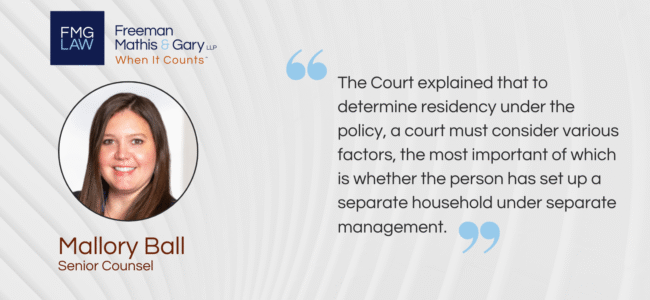BlogLine
Georgia Court of Appeals decides “resident relative” determination is for the jury
4/16/25

By: Mallory D. Ball
The Georgia Court of Appeals held in Allred v. Progressive County Mutual Insurance Co. that residence and domicile – and, in turn, whether a person qualifies as a “resident relative” under an insurance policy – typically present mixed questions of law and fact for the jury to answer.
There, Stephanie Allred sought uninsured/underinsured motorist coverage benefits from her parents’ automobile policy after she was involved in a motor vehicle accident. At the time, she attended graduate school in Atlanta, where she rented an apartment and sometimes worked. She was single, had no children and drove a vehicle insured by another policy for which her father paid the premiums. Allred also maintained a room at her parents’ home in Ohio, which she visited two or three times over an 18-month period. After the accident, she moved in with her parents.
Allred’s parents’ automobile policy defined “relative” as: “A person residing in the same household as you, and related to you by blood, marriage or adoption and includes a ward, stepchild or foster child. Your unmarried dependent children temporarily away from home will qualify as a relative if they intend to continue to reside in your household.”
The court explained that to determine residency under the policy, a court must consider various factors, the most important of which is whether the person has set up a separate household under separate management. Other overarching factors include financial independence and living accommodations. In reversing summary judgment awarded to the insurer, the Court of Appeals found the following created a question of fact as to Allred’s residency at the time of the accident – the room Allred maintained at her parents’ house, the financial assistance she received from her parents and her status as an unmarried college-aged student with no kids who rented an apartment. Based on these facts, the Court of Appeals held that a jury could determine that Allred intended to continue living with her parents in Ohio and only intended to live in Georgia temporarily. Without providing more detail, the court recognized there may be “outlier” cases that could be resolved on summary judgment, but this case was not one of them.
For more information, please contact Mallory D. Ball at mallory.ball@fmglaw.com or your local FMG attorney.
Information conveyed herein should not be construed as legal advice or represent any specific or binding policy or procedure of any organization. Information provided is for educational purposes only. These materials are written in a general format and are not intended to be advice applicable to any specific circumstance. Legal opinions may vary when based on subtle factual distinctions. All rights reserved. No part of this presentation may be reproduced, published or posted without the written permission of Freeman Mathis & Gary, LLP.
Share
Save Print
